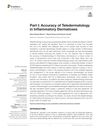 2 citations,
April 2019 in “Acta medica Philippina/Acta Medica Philippina”
2 citations,
April 2019 in “Acta medica Philippina/Acta Medica Philippina” People with alopecia areata often have lower vitamin D levels than healthy people.

 December 2023 in “EPRA international journal of multidisciplinary research”
December 2023 in “EPRA international journal of multidisciplinary research” Alopecia areata causes sudden hair loss, has genetic links, and can be managed but not cured.
 4 citations,
October 2012 in “Expert Review of Dermatology”
4 citations,
October 2012 in “Expert Review of Dermatology” Dermoscopy greatly improves melanoma diagnosis and reduces unneeded surgeries.
13 citations,
September 2022 in “Biomolecules” The research confirms that Hidradenitis Suppurativa is characterized by increased inflammation, disrupted skin cell organization, and abnormal metabolic processes.
 2 citations,
November 2023 in “Frontiers in microbiology”
2 citations,
November 2023 in “Frontiers in microbiology” The health of the gut may be important in developing new ways to prevent, diagnose, and treat alopecia areata.
 2 citations,
February 2009 in “Journal of the American Academy of Dermatology”
2 citations,
February 2009 in “Journal of the American Academy of Dermatology” Many research paper titles in dermatology journals lack scientific precision.
 17 citations,
August 2019 in “Frontiers in Immunology”
17 citations,
August 2019 in “Frontiers in Immunology” Non-invasive methods show promise for diagnosing skin diseases like psoriasis and lupus but need more research for regular use.
 12 citations,
February 2023 in “Journal of Personalized Medicine”
12 citations,
February 2023 in “Journal of Personalized Medicine” Type 1 diabetes often occurs with other autoimmune diseases, and personalized treatment based on genetics can improve outcomes.
 2 citations,
June 2023 in “Indian journal of dermatology, venereology, and leprology”
2 citations,
June 2023 in “Indian journal of dermatology, venereology, and leprology” Janus kinase inhibitors can regrow hair in alopecia areata but may cause side effects and hair loss may return if treatment stops.
 July 2022 in “Journal of the Dermatology Nurses' Association”
July 2022 in “Journal of the Dermatology Nurses' Association” The document encourages attending the 2023 Dermatology Nurses' Association Convention.
 May 2023 in “Journal of the Dermatology Nurses' Association”
May 2023 in “Journal of the Dermatology Nurses' Association” The DNA convention was a valuable opportunity for learning and networking, especially after COVID-19.
 December 2023 in “Journal of health and rehabilitation research”
December 2023 in “Journal of health and rehabilitation research” Oral Apremilast effectively treats alopecia areata in most patients.
 1 citations,
May 2022 in “IntechOpen eBooks”
1 citations,
May 2022 in “IntechOpen eBooks” Obesity leads to physical, metabolic, reproductive issues, higher healthcare costs, and mental health problems.
 13 citations,
October 2020 in “Frontiers in Medicine”
13 citations,
October 2020 in “Frontiers in Medicine” Teledermatology is highly accurate for diagnosing inflammatory skin conditions.
 1 citations,
July 2020 in “Dermatology”
1 citations,
July 2020 in “Dermatology” Photobiomodulation helps reduce pain, lessen inflammation, heal wounds, and can be used in skin treatments. It also boosts hair growth in women with hair loss and may help fight microbes and prevent respiratory issues in COVID-19.
 September 2023 in “International journal of medicine”
September 2023 in “International journal of medicine” AI is revolutionizing healthcare by improving diagnosis, treatment, and monitoring, but still needs close supervision.
 26 citations,
August 2020 in “Dermatology Research and Practice”
26 citations,
August 2020 in “Dermatology Research and Practice” COVID-19 can cause various skin problems, including reactions to protective gear and medication, with different rates reported worldwide, and more research is needed to fully understand these skin issues.
 56 citations,
January 2021 in “Clinical and Experimental Medicine”
56 citations,
January 2021 in “Clinical and Experimental Medicine” The document concludes that while there are various treatments for Alopecia Areata, there is no cure, and individualized treatment plans are essential due to varying effectiveness.
17 citations,
January 2019 in “Journal of cutaneous medicine and surgery” JAK inhibitors show promise for treating hair loss in alopecia areata but need more clinical trials to confirm safety and effectiveness.
19 citations,
January 2013 in “Annals of Dermatology” Early high-dose steroid treatment helps prolong disease-free periods in severe alopecia areata.
2 citations,
August 2022 in “Frontiers in Immunology” Microneedling with betamethasone led to almost complete hair regrowth in severe alopecia areata.

Herbal remedies might help with hair loss but need more research for safety and effectiveness.
 111 citations,
March 2012 in “Expert Opinion on Drug Delivery”
111 citations,
March 2012 in “Expert Opinion on Drug Delivery” Liposomes could improve how skin care products work but are costly and not very stable.
 15 citations,
March 2021 in “Journal of clinical medicine”
15 citations,
March 2021 in “Journal of clinical medicine” Biologic treatments for Crohn's disease and ulcerative colitis can cause skin problems, and doctors should adjust treatment if these occur.
 152 citations,
December 2007 in “Gender Medicine”
152 citations,
December 2007 in “Gender Medicine” Male and female skin differ due to hormones, affecting conditions like hair loss, acne, and skin cancer, and suggesting a need for gender-specific treatments.
 7 citations,
July 2011 in “Survey of Ophthalmology”
7 citations,
July 2011 in “Survey of Ophthalmology” The document concludes that periocular hair disorders have various causes and treatments, and proper evaluation by specialists is important for management and prognosis.

The document concludes that dermatology training and grading scales need to better represent dark-skinned individuals to improve diagnosis and assessment of skin conditions.
 26 citations,
January 2019 in “Expert Opinion on Investigational Drugs”
26 citations,
January 2019 in “Expert Opinion on Investigational Drugs” New treatments for hair loss show promise, but more research is needed to confirm their safety and effectiveness.
 April 2019 in “Journal of Investigative Dermatology”
April 2019 in “Journal of Investigative Dermatology” Sandalore®, a synthetic scent, improved hair loss and satisfaction in women with telogen effluvium.


























